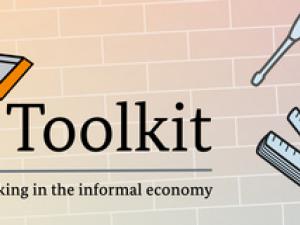GOOD PRACTICE: “Proficient Acquired Skills” (PAS): a certification for skills and competencies for informal workers (Uganda).
Discussion details

Technical and Vocational Education Training (TVET) is the most direct route for strengthening the capacities of individuals. However, two issues are to be solved regarding TVET.
Engaging in on the job training is a major characteristic of informal workers. In the informal economy, people often obtain their skills through apprenticeship in informal sector micro-enterprises. These skills are often not recognised in the formal sector. The workers’ mobility from the informal to the formal economy is thus constrained and reduces the opportunities for informal workers. The validation of the skills acquired on the job through apprenticeship pose a challenge to the formalisation of informal economy operators and workers.

The official recognition of diplomas and training certificates is a long and bureaucratic process in most countries. It can take years with a low probability of success. An interesting good practice for projects on TVET consists of negotiating the certification of acquired skills with employers’ associations.
In many countries the main problem with the official TVET system is that it is often accused of producing types of qualifications that are not adapted—or no longer adapted—to market needs. That is, the types of training do not match the employers’ demand for different types of skilled workers. As a result, the graduates of formal TVET institutions often have one recourse, that is find or to create a job in the informal economy. Employment in the informal economy is thus fed by the outputs of the formal TVET system that does not fit with the qualifications required in the labour market. At the same time, individuals who have completed informal systems of apprenticeship or skills training are prevented from finding jobs in the formal sector due to the absence of formal recognition of their training.

A good practice in this domain is the “Proficient Acquired Skills” (PAS) document that was developed and implemented in Uganda in partnership with the Ugandan Association of Private Training Providers (UGAPRIVI). The PAS certifies the skills and competencies of an individual in a particular trade and assesses the strengths of the holder as well as his skills gaps.
A large scale and low-cost non-formal educational and training approach of “Local Skills Development” and DACUM (for “Developing an CUrriculuM”) were developed. Through DACUM, a participatory process and method for describing any occupation in terms of duties, tasks, knowledge, skills and traits, in relation to 8 trades:hairdresser, tailor, motorcycle mechanic, motor vehicle mechanic, welder, metal fabricator, plumber, carpenter and joiner, the project aimed at providing appropriate training opportunities to the unemployed and potential or actual workers in the informal economy. The method developed private sector driven and innovative non-formal modes of skills training and their accreditation, in partnership with several employers’ associations such as the Ugandan Small Scale Industries Association (USSIA) or the Ugandan Hair and Beauty Alliance (UHABA). It included interventions in capacity building, institutional development, coaching and technical assistance of training providers, stimulation of collective action of workers and employers for linkages and network development, career guidance, pre-vocational skills training and advocacy.

Once the assessments for the selected trades are completed and the qualification process is in place to deliver the PAS document, it is no longer depending on human and financial resources. The provision of PAS documents is then a service that can be delivered without permanent costs: the costs of the qualification and certification processes are charged to the beneficiaries. The online Worker’s PAS database captures the personal data with corresponding assessment results of each trainee to be promoted among potential employers.
Although the PAS assessment might be considered a public service, it was conceived as a service to be delivered by a private sector player. The private sector operator would have business plans, pricing strategies, marketing strategies as opposed to awareness campaigns. He or she would also have business networks and clients rather than beneficiaries thus ensuring a more creative implementation. The reverse of the medal is that without public subsidies, the system remains inaccessible for the poor who cannot afford the ensuing costs. The PAS progressively gained recognition through approval of the Directorate of Industrial Training and became part of the Ugandan Vocational Qualification Framework.
Among the main benefits and uses of the PAS, the facilitation of placements of trainees among USSIA member enterprises should be noted. Likewise the matching of identified skills with the needs of the labour market and the enhancement of employability of PAS’ holders through the demonstration of skills to clients are important factors. The access of small businesses to tendering is facilitated, In the psycho-social sphere there is increased personal confidence of the holders, increased support from relatives and recognition in the community as well better interaction with local/central authorities.
________________________________________________________________________________
Identification of Innovative Approaches to Livelihood Enhancement, Equity and Inclusion of People Dependent on the Informal Economy
Volume 1: Good Practices and Lessons LearnedExtracted from 33 Projects Selected Under the 2009 EC call for Proposals:“Investing in People. Promoting social cohesion, employment and decent work. Support for social inclusion and social protection of workers in the informal economy and of vulnerable groups at community level”
March 2016
By Jacques Charmes, Mei Zegers
Log in with your EU Login account to post or comment on the platform.